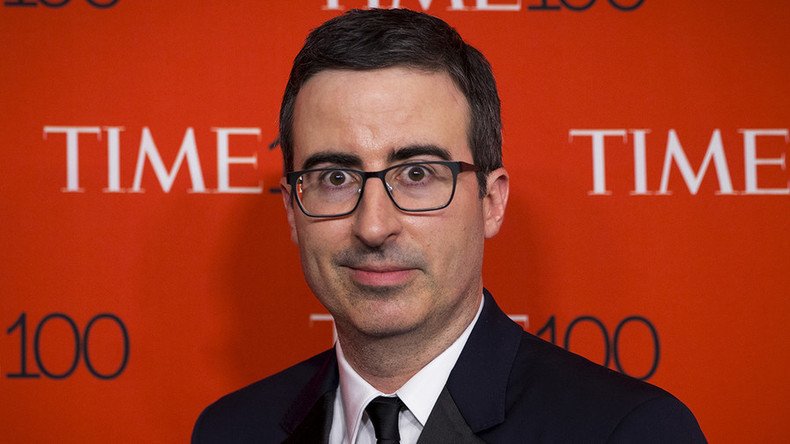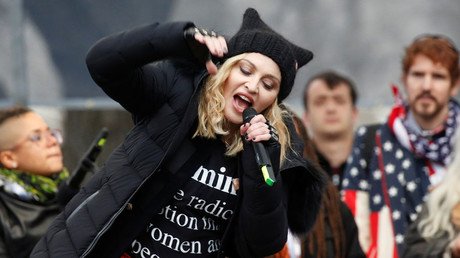Another season of John Oliver, shameless pro-establishment shill

This Sunday, season four of John Oliver’s Last Week Tonight premieres. If the last three seasons were any indication, viewers can expect no deviation from the official party line by the establishment’s favorite comedy accomplice.
Let’s just cut right to the chase. John Oliver is a charlatan who appears to be a rebellious liberal comedian speaking truth to power. In reality, he is a shameless shill for the ruling class in the United States.
Oliver, who hails from West Midlands, England, specializes in telling his liberal audience and those in the establishment exactly what they want to hear. He never genuinely challenges or questions the American power structure, thereby making him an agent of the status quo, which is why the media adores him.
In order to maintain most favored status among liberals, Oliver assails universally loathed entities, like FIFA, the NCAA, big tobacco or televangelists. Or he’ll investigate a wonky subject, like crumbling infrastructure, voter ID laws or reforming the bail system. While Oliver gets quite a lot of attention for these stories, they only generate heat, not light. Nothing changes as a result, not even popular opinion since Oliver is only preaching to the converted in the liberal echo chamber.
When it comes to potentially controversial topics, like the rare moments when he looks at the US political, military and media establishment, Oliver can be relied upon to give his sycophant fans the soft sell.
To date, there have been 250 segments among the 89 episodes of Last Week Tonight. In those segments, Oliver has scrutinized issues pertaining to the US military and foreign policy just 11 times, that’s 4.4 percent. In contrast, the show has dedicated 14 or 5.6 percent of their segments to Russia, Putin and Russia’s foreign policy. And those numbers do not include the innumerable one-liners at Russia’s expense that Oliver scatters throughout various other segments. Putin is Oliver’s favorite comedy whipping boy.
Even when Oliver looks into issues like drones, torture, Guantanamo Bay or NSA spying, he does so with the gentlest of tones and the kindest of language. For example, in regards to drones he called U.S. strikes, which killed civilians, “a little disturbing”. At end of the segment he concluded that now “might be the time to think about drones”. So his scathing assessment of the drone program was that it might now rise to the level of “thinking about”? And I guess “might” was the operative word in his statement since Oliver has never returned to the topic.
Contrast this delicate approach to the U.S. with his scorched earth campaign against Putin, where Oliver leads a cacophony of establishment media voices preaching a Russian hysteria. Oliver has assured his audience, without any shred of proof, that the “brutal Russian dictator” shot down MH17, invaded Ukraine, committed war crimes in Syria, among a number of other totally wrong-headed accusations. Oliver’s stance on Russia is just as vacuous, assumption-filled and fact-free as the rest of the mainstream media. A braver comedian would challenge the current prevailing presumptions, but courage is obviously not John Oliver’s strong suit.
Even when Oliver is mildly critical of the U.S., like he was in his torture and Gitmo pieces, he deflects those American failures by pointing to other nations that he feels are much, much worse, like Russia, North Korea, Iran, and Sudan. He also avoids using moral and ethical frameworks to argue against alleged US failings, instead favoring arguments about “image”.
Oliver’s main thrust on torture was that it causes “serious harm to America’s image”. He had an entire segment titled “The CIA’s Public Image” which dealt with how the CIA handles its social media. Of all the things to talk about regarding the CIA, their social media prowess seems to be the most frivolous, which is probably why Oliver chose it.
In Oliver’s interview with NSA chief Keith Alexander, an important part of the conversation was on the NSA’s image and how to change it for the better, not on its Orwellian surveillance programs. When it comes to questioning the U.S. establishment, Oliver never dares to wander into the heart of the matter; he stays on the surface and stick to appearances.
So the discussion with Keith Alexander was very enlightening when contrasted with Oliver’s interview with Edward Snowden. Watching the Alexander and Snowden interviews side by side, it is easy to see where Oliver’s loyalties lie. He uses the softest and most playful tone with Alexander, whereas he is extremely aggressive and nasty with Snowden.
The Snowden interview also reveals Oliver’s tactic of obfuscating uncomfortable issues. Oliver spends the first half of his Snowden segment making the story about how frightened he is to be in Russia. He is fearful because Snowden is late, the old KGB building is up the street and Russians are no doubt listening to his every word. You could come away from these bits thinking it is Russia that’s been eavesdropping on the world and not the US. And that that seemed to be Oliver’s agenda with the Snowden interview, and many other segments: distract from US crimes by imagining foreign ones.
The cherry on top of the Snowden episode was when John Oliver actually blamed Edward Snowden for the “major f*ck-up” of the New York Times publishing information that allegedly named a secret agent and a target. In John Oliver’s world, the New York Times is sacrosanct and above blame, but that scoundrel Snowden makes for a convenient scapegoat.
Lies of omission are littered throughout Last Week Tonight episodes as well. When Oliver did a segment on Obama’s visit to Saudi Arabia, he made the story about how rude the Saudi’s were to the president but gave no context at all. According to Oliver, the Saudi’s just randomly decided to hate Obama. Of course, the actual context is pretty important, since Obama went to Saudi Arabia to calm the royal family over the 9-11 lawsuits and the congressional bills opening up the Saudis to liabilities for the attacks. Why Oliver would ignore this is beyond me.
When Oliver doesn’t ignore context is also revealing. In two segments on Ramzan Kadyrov, the Sunni strongman in Chechnya who had lost his cat, Oliver went to great lengths to emphasize Kadyrov’s ties to Putin. He also spoke of Kadyrov’s Wikipedia page, which has a section about his human rights abuses, and spoke of it as if it were some sort of smoking gun. This is curious, as there was no mention of human rights abuses when another group of despotic Sunni Muslims, the Saudi’s, were the topic. And the Saudi’s don’t just have a section on their Wikipedia page about human rights abuses, they have a whole page dedicated to their human rights abuses! But Kadyrov is an enemy of the U.S. establishment and the Saudi’s are protected by it, so Oliver acted accordingly.
Oliver only uses context when it supports the official narrative, not when it undermines it. A case in point was his coverage of the protests in Brazil against the left-wing Workers Party government. Oliver made that story about left wing corruption in Brazil, and nothing more. A closer examination of those protests reveals that a major factor was class and race, with wealthy Whites protesting against the government and poor Black/Brown people protesting for it. Race and class would normally be things that someone like John Oliver, and his liberal audience, would focus on, he certainly would in relation to the Tea Party or Trump supporters here in the U.S. But in South America, the official U.S. narrative is left-wing, populist governments are “no bueno”, and so Oliver, whether it be in regards to Dilma Rousseff in Brazil or Rafael Correa in Ecuador, propagates that position.
In contrast to his coverage of Brazil, watch this segment on turmoil in another left-wing South American country, Venezuela. In it, Oliver opens with a news story that clearly defines the context of the protests, with the poor and working class on one side, and the military and police on the government side. Why clarify the struggle in Venezuela so distinctly but keep the Brazil situation murky at best? Because context in the Venezuela story supports the establishment media narrative that Oliver wants to sell, while undermining it in the Brazil story.
And finally, the most remarkable proof of Oliver being an establishment shill occurred on the season three finale. Oliver actually pleaded with his audience to subscribe to the New York Times and the Washington Post in order to counter Trump and 'fake news'. This was the first time John Oliver ever made me laugh out loud, as buying the Times and Post as an antidote to fake news is like treating obesity with a diet of pizza and ice cream.
It is too bad that Oliver’s insipidly predictable comedy and insidious support for all things establishment are so beloved by his minions. They obviously don’t know it yet, but John Oliver isn’t laughing with them, he’s laughing at them, all the way to the bank.
Michael McCaffrey, for RT
Michael McCaffrey is a freelance writer, film critic and cultural commentator. He currently resides in Los Angeles where he runs his acting coaching and media consulting business. mpmacting.com/blog/
The statements, views and opinions expressed in this column are solely those of the author and do not necessarily represent those of RT.














